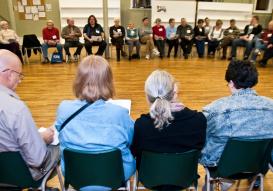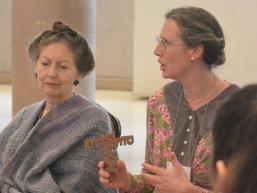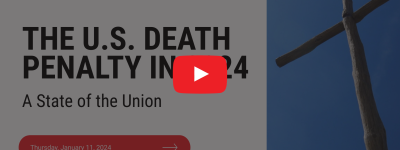
What Are Restorative Circles?
Restorative circles (sometimes called circle process or peacemaking circles) are a core restorative practice that create opportunities for participants to share openly and listen intentionally with one another. Rooted in indigenous tradition, circles can be used in instances of conflict and harm, as well as for storytelling, shared reflection, and community building. Increasingly, Catholic parishes and ministries use restorative circles to live in right relationship with one another and foster encounter among those impacted by crime.
For many Catholics, after learning about the principles and practices of restorative justice, they wish to become trained in circle keeping. This page offers some discerning questions and a non-definitive list of organizations experienced in conducting circle trainings with faith communities.
Click here to learn about CMN's annual Circle Keeper training >>
Choosing a Trainer
In many cases, there are local organizations who offer circle training opportunities for individuals, parishes, or ministry groups. When looking for a circle trainer, consider the following for your group:
Discern your intentions and hopes:
-
Who do you want to be trained? Will participants be volunteers, staff, students, clergy?
-
Where do you see participants using circles? Within a parish, an organization, a Catholic school, direct community service, prison chaplaincy, re-entry ministry?
-
For what purpose do you want to use circles? Community building, addressing harm and conflict, supporting individuals and families impacted by crime and incarceration, holding difficult conversations, addressing racial injustice?
Ask about the trainer’s experiences:

-
How long has the trainer worked in the area of restorative justice? What are some of their core values for restorative justice practice?
-
What other related fields have they worked in? Criminal justice, law enforcement, education, community organizing, pastoral ministry, social work and counseling, medicine, youth work, teaching, or theology?
-
What experiences do they have working in Catholic settings or other church-related contexts? What communities do they work with most often?
-
What experience does the trainer have in working with the population/demographic or issue areas that you hope to gain skills in?
-
Who are the trainers favorite RJ thinkers, writers, or researchers? What did the trainer learn from these people?
-
How does the trainer evaluate their trainings? Can they offer you references?
-
Who might the trainer suggest you contact as a reference to learn about other’s experiences working with her/him?
Discuss logistical considerations:
-
How much is their training fee? What other expenses might need to be covered or travel, food, materials? Likewise, your group should consider what financial resources you can commit to a training.
-
How many days are required for the training? Many circle trainings last 3-5 days, these may be in a row or over time.
-
What kind of room, space, or equipment is needed?
-
How would the trainer like participants to prepare? Circles are best when participants can engage the process from start to finish. Clarify with participants the commitment necessary for their dedicated presence for the circle training. This has implications for cell phone use, late arrivals, early departures, etc...
-
What would the trainer like to hear from participants prior to the training? Asking participants to respond to certain questions prior to the training can help to inform the trainer, it also helps participants prepare for their own involvement.
Suggested Contacts
CMN seeks to connect skilled trainers with those who have emerging interest in using circles among Catholic communities. The following list is based on recommendations by trusted restorative justice practitioners. Some of these entities host their own circle trainings, others can connect you with individual trainers for your group. CMN receives no finders fees and offers no formal endorsements. The entities listed are not necessarily Catholic, but have experience working with faith-based groups and are inclusive in their process.
East Coast
Center for Restorative Approaches (New Orleans, LA)
Jen Pagan, jpagan@thecra.net, 504-249-5274
DC PeaceTeam (Washington, DC)
Eli McCarthy, esm52@georgetown.edu, 510-717-8867
Eastern Mennonite University - Center for Justice & Peacebuilding (Harrisonburg, VA)
Alena Yoder, alena.yoder@emu.edu, 540-432-4490
Georgia Conflict Center (Athens, GA)
Janice Jerome, jjerome@gaconflict.org, 706-206-7472
The Circle Center (Nashville, TN)
Tracy Roberts, tracy@
Midwest
Center for Conflict Resolution (Kansas City, MO)
Annette Lantz-Simmons, alantz@ccrkc.org, 816-461-8255
Kansas Institute for Peace and Conflict Resolution - KIPCOR (North Newton, KS)
Eva Lapp, emlapp@bethelks.edu, 316-284-5882
Marquette University Restorative Justice Initiative (Milwaukee, WI)
Mary Triggiano, mary.triggiano@arquette.edu
Minnesota Peacebuilding Leadership Institute (Minneapolis, MN)
Crixell Shell, crixell@mnpeace.org, 612-377-4660
Precious Blood Ministry of Reconciliation (Chicago, IL)
Pamela Purdie, purdie@pbmr.org, 773-952-6643
Restoration Matters (St. Louis, MO)
Lynne Lang, info@restorationmatters.org, 314-822-7641
Stonebridge - Center for Healing and Reconciliation (St. Paul, MN)
Pat Thalhuber, B.V.M., pthalhuber@aol.com, 651-717-5028
The Institute for Restorative Justice and Restorative Dialogue (Weatherford, TX)
Erica Mason, rjmallori@outlook.com, 512-300-9662
University of St. Thomas - Initiative on Restorative Justice & Healing (St. Paul, MN)
Julie Craven, CRAV6181@stthomas.edu, (651) 962-4933
West Coast
Archdiocese of Seattle - Criminal Justice Ministry (Seattle, WA)
Joe Cotton, joe.cotton@seattlearch.org,
Croi Restorative Dialogue (Huntington Beach, CA)
Anne Buchanan, annegbuchanan@gmail.com, 714-393-4389
Diocese of San Diego - Office for Life, Justice, and Peace (San Diego, CA)
Robert Ehnow, PhD, rehnow@sdcatholic.org, 858-490-8375
Insight Prison Project (San Quentin, CA)
Yadira Ramirez, yadira@insightprisonproject.org, 415-459-9800
Loyola Marymount University - Center for Urban Resilience (Los Angeles, CA)
Schoene Mahmood, schoene.mahmood@lmu.edu, 310-338-4442
National Compadres Network (National)
Mario Ozuna-Sanchez, mos@compadresnetwork.org, 408-484-4161
Restorative Justice Education (Fort Collins, CO)
Tom Cavanaugh, cavanaugh.tom@gmail.com, 970-297-8795
The Circle Works (Seattle WA)
Pamela Taylor, circleworks4sj@gmail.com, 206-851-9782
For additional questions about finding a circle trainer for your group, contact Caitlin Morneau at caitlin@catholicsmobilizing.org.


